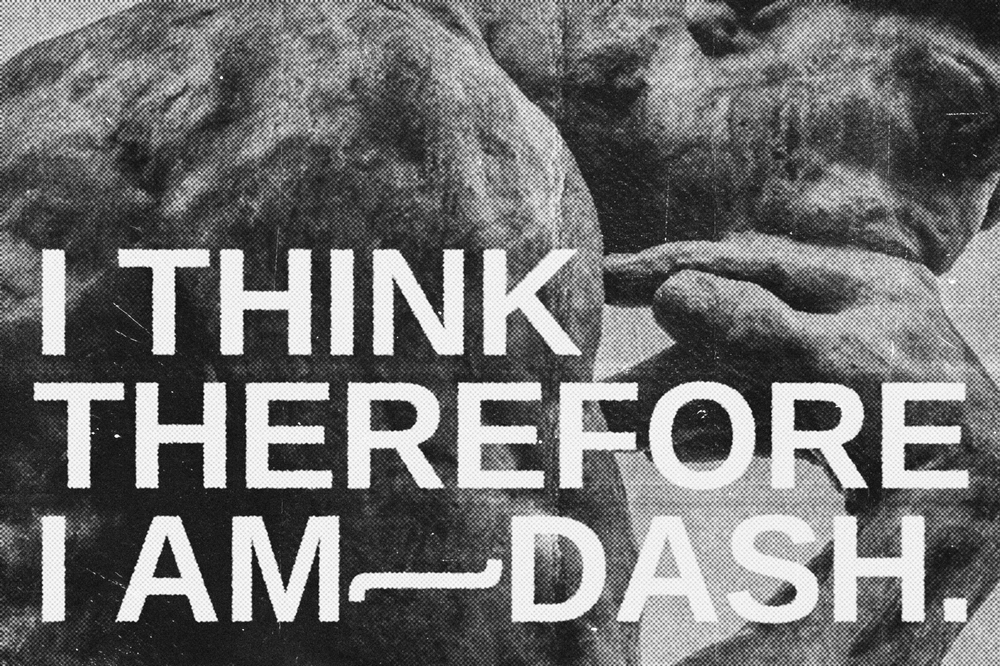
Punctuation can be like spices in food. They flavor and enhance the dish, but too much can overwhelm the blend and ruin the meal. The em dash has always been like sumac: a great, complex flavor in its place, but one that can confuse people unfamiliar with it, and distasteful if overused. AI chatbots like ChatGPT often seem to treat it more like salt, sprinkling em dashes liberally across their writing, and leading many to associate the misunderstood bit of grammar with writing that appears to be untouched by human hands.
The em dash—that long, handsome horizontal line—is incredibly flexible, which is why many people feel anxious about employing it. It can replace commas, parentheses, colons, and ellipses and serve as a stylistic flourish for any kind of writing. It's been popular with everyone from Ernest Hemingway and Emily Dickinson to James Joyce and Stephen King. However, it's now seen as the calling card for AI writing.
ChatGPT and other AI models understand the em dash and how to use it, but AI seems enamored of how flexible the em dash can be, slotting it into places where you might normally find an array of other punctuation. It has become a way of identifying AI writing simply because most people don't use them in everyday writing. It's not even on a standard keyboard, unlike the shorter en dash. You have to make an effort to insert the em dash, and ChatGPT can input it far more quickly than a human.
ChatGPT is trained on a huge dataset of text culled from across the internet. The result is a funhouse mirror version of all those styles, and it turns out that blend has a bottle of grammatical sumac spilling into it.
Em dash deleted
I haven't used the em dash very frequently in my career as a journalist, but I have employed it with some regularity in my fiction writing. It's not a principle, just a preference. But the stories of em dash abundance in AI writing have made me second-guess myself as I compose stories and articles.
Accusations of AI fakery are hard to fight. Sometimes my writing may not be particularly inspired, but that's often conflated with being written by AI. My linguistic paranoia now means I almost never include an em dash like I used to.
If you are using AI writing tools, even in the most innocent circumstances, you may find the constant use of em dashes annoying. You can just tell ChatGPT or whatever other AI chatbot what you want. Literally. When you write a prompt, add the line, "Avoid using em dashes in the response," or "Use commas and periods instead of em dashes." The model will oblige in most cases.
You can also add it to the memory of ChatGPT or equivalent in other chatbots. Further, you can bend AI to your stylistic will in most ways if you're specific.
A few brave typographical innovators have tried to reinvent the em dash. For instance, the "am dash," developed by Australian creative agency Cocogun, is supposed to declare human originality. If the em dash has been co-opted by machines, the thinking goes that maybe humans need a new dash of their own that AI can't copy. You can see what it looks like below.

Whether it will take off remains to be seen, but it seems unlikely. Keyboard shortcuts aren't built for rebellious punctuation, and you'd have to spend time explaining it to every reader and editor you encounter.
Plus, writing like a human isn't just about punctuation. It's about the rhythm and cadence of the language. The word choices and syntax choices, and a million other choices reflecting your thoughts and personality. Using an em dash doesn't remove your soul and make you a robot, no matter how suspicious people may be about it.
I don't want to throw out the em dash just because a few trillion tokens got too enthusiastic about the punctuation. It’s still one of the most expressive grammatical tools in the English language. It lets you stretch a thought or interrupt yourself, even convey irony. But, it may have to be restricted to my fiction writing until people learn that a little bit of sumac doesn't mean my soup is from a can.
You might also like
- I compared ChatGPT's new image generator to DALL-E 3, and it's an astonishing improvement, if you have the patience
- I refuse to jump on ChatGPT’s Studio Ghibli image generator bandwagon because it goes against everything I love about those movies
- Blade Runners of LinkedIn are hunting for replicants – one em dash at a time







